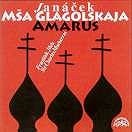This disc has much to recommend it. There is the sheer
authenticity of the performers; an acknowledged Janáček
expert in the shape of Sir Charles Mackerras for Amarus;
and the coupling is positively inspired.
The Glagolitic Mass comes up against massive
competition. Ancerl’s 1963 Czech Philharmonic performance also crops
up on Supraphon (11 1930-2) and, of course, there is Simon Rattle’s
rightly-lauded 1981 account (EMI Great Recordings of the Century CDM5
66980-2), not to mention the expert choral forces of Robert Shaw’s Telarc
version (CD80287) from 1990, to refer to only three. The conductor of
the present performance, František Jílek, was conductor of the
Janáček Opera, Brno and the
Brno State Philharmonic (he died in 1993). He was with Brno’s opera
company for 25 years, during which he conducted the complete operas
of Smetana and Janáček (he
also put down Janáček’s complete
orchestral works for Supraphon): impeccable credentials!. His immersion
with Janáček’s music is evident
from his expertly paced ‘Glagolitic,’ his rapport with his players clear
from their dedication. This can be heard clearly in the orchestral first
movement with its characteristic overlapping brass fragments. Jílek
can be warm, also, when appropriate.
Janáček’s compositional
mastery manifests everywhere in this magnificent work. The performance
is blessed by the soprano soloist, Gabriela Beňačková, a star
high in the Supraphonesque firmament. She is entrancing in the
‘Sanctus’, her entrance perfectly prepared by the delicate realisation
of Janáček’s score that precedes it
. A pity the tenor, Vilém Přibyl, is not quite as subtle, and the
bass, Sergej Kopčák, is weak. Contralto Eva Randová
makes her mark in the ‘Agnus Dei’. The organ solo (movement 7), played
by Jan Hora, is staggering: his pedal work is breathtaking. The only
problem is that this seems to have been recorded in a different acoustic
entirely (the sound is actually very close indeed). This remains a valuable
account of the Glagolitic Mass, however, and it is recommendable.
Mackerras’s recording of the rarely-aired Amarus
is something of a find. Whilst coming from earlier in Janáček’s
output, his fingerprint is clear. Influences are possibly more pronounced,
though: there are some lovely Dvořák-like woodwind moments in the
first movement .
Amarus is the tale of a monk who asks an angel
when he shall die: the answer is when he fails to put oil in the lamp
on the altar. Eventually he is distracted by the sight of two lovers,
and the inevitable happens. There is a lyrical, yearning side to the
writing. Choir and orchestra realise their parts with total commitment.
Leo Marian Vodička is the excellent
narrator. A pity that the Czech text and its English translation are
not aligned in the booklet so it becomes quite difficult to work out
exactly where one is at times. A special mention should go to the solo
violin (track 12) and to the lovely woodwind interjections of
track 11.
A most rewarding disc, and while Amarus may
not be for everyday listening, it remains well worth excavating.
Colin Clarke

